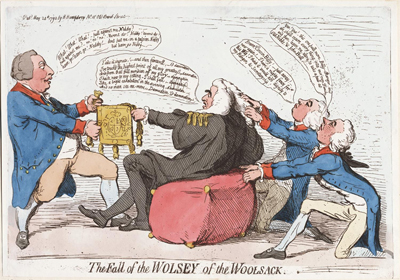The Fall of the Wolsey of the Woolsack
This print shows the long-standing Chancellor of England, Edward Thurlow, in the process of losing his job as the major symbols of his position are removed by the King on one side and Prime Minister William Pitt and his cousin, William Grenville on the other. The King is pulling on the purse containing the Great Seal. Grenville is removing the Chancellor's ceremonial wig, and the Prime Minister is pulling out Thurlow's very seat, the Chancellor's woolsack, from under him.

© Lewis Walpole Library, Yale University
The immediate occasion for Thurlow's dismissal was explained in the London Lloyd's Evening Post on May 18, 1792:
Pitt, having considered the conduct of the Lord Chancellor on the National Income and Expenditure Bill, not only as a direct and decided mark of hostility to his Ministerial measures, but having also felt-the language made use of on the occasion as a personal affront to himself, he formed a resolution of resigning his situation, if Lord Thurlow was permitted to hold the Chancery Seals.
In other words, Pitt had presented the King with a choice: to retain either him or Thurlow. The King lost no time in responding to Pitt's ultimatum. He wrote a letter that very evening addressed to the Chancellor "declaring that he had no further occasion for his services."
Until this episode, Thurlow had seemed to be the ultimate political survivor. He had held a variety of positions in several administrations beginning in 1770. And he had served as Lord Chancellor with only one small break since 1778 under a succession of prime ministers including Lord North, the Marquess of Rockingham, the Earl Shelburne, and William Pitt. But Pitt had been less than enamoured with him ever since the Regency Crisis of 1788 when Thurlow's fluctuating support for the Regency Bill made it clear to both Whig and Tory leaders that Thurlow's only allegiance was to himself.
In their commentary on Sin, Death, and the Devil, Thomas Wright and Joseph Grego quote an anonymous assessment of Thurlow from that time:
Here lies, beneath the prostituted mace,
A patriot, with but one base wish—place.
Here lies, beneath the prostituted purse,
A peer with but one talent, how to curse. . . .
Statesman, with but one rule his steps to guide
To shun the sinking, take the rising tide.
With sentiments like these in the air, it is not surprising that Gillray would have seen the analogies between Thurlow and another self-serving Chancellor, Thomas, Cardinal Wolsey. And as so often happens, in Gillray's prints, Thurlow's words are (mostly) a quotation from a play, in this case Shakespeare's History of Henry VIII from Act III, Scene 2, lines 274ff where Wolsey finds out that his double dealing has been discovered. Here is Shakespeare's version:
Nay then, farewell!
I have touched the highest point of all my greatness,
And from that full meridian of my glory
I haste now to my setting. I shall fall
Like a bright exhalation in the evening
And no man see me more.
As mentioned earlier, Thurlow was known for his rough, blunt manner of speaking, so in Gillray's version, he peppers Wolsey's speech with Thurlow's characteristic expletive.
The damning comparison of Thurlow and Wolsey, however, does not mean that Pitt and Grenville get off without reflection on their conduct. Continuing the critique he began in A Good Shot, or Billy Ranger, the Gamekeeper, in a Fine Sporting Country (February 1, 1782), Gillray portrays Grenville as a greedy place-seeker, grabbing the Chancellor's wig, trying to add that honor to his already growing list of positions and places. Pitt, for his part is portrayed as wishing to create a dynasty of his own ("one pull more Billy-Ranger, and we shall secure every thing into our own Family"). He had already brought his older brother Chatham into the Cabinet as first Lord of the Admiralty. He had made sure to appoint his more competent cousin, Grenville, to succeed the Duke of Leeds at the Foreign Office and then elevated him to the peerage. And Gillray makes clear that Pitt's own ambitions are not necessarily satisfied ("then leave me alone to take a pull at Old Nobbs, & John Bull"). As often happens in Gillray's prints, no one escapes whipping.
Sources and Reading
- Commentary from the British Museum on The Fall of the Wolsey of the Woolsack.
- "Edward Thurlow, 1st Baron Thurlow," Wikipedia
- "Thomas Wolsey," Wikipedia
- "Woolsack," Wikipedia
- "Lord Chancellor," Wikipedia
- Thomas Wright and R.H. Evans, Historical and Descriptive Account of the Caricatures of James Gillray #82
- Thomas Wright and Joseph Grego, The Works of James Gillray, the Caricaturist; With the History of His Life and Times
Comments & Corrections
NOTE: Comments and/or corrections are always appreciated. To make that easier, I have included a form below that you can use. I promise never to share any of the info provided without your express permission.